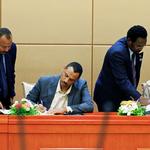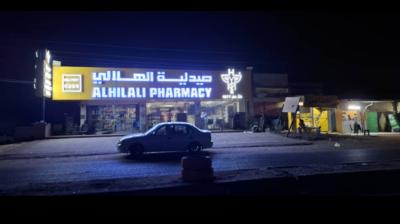Sudan: Nothing is sacred for president Omar al-Bashir
Protesters who have been injured during the Sudanese intifada have sought medical assistance at the hospitals. But not even the hospital can offer safety from the regime’s bullets. Nothing is sacred for president Omar al-Bashir. He has made hospitals and health personnel targets.
Sudan's President Omar al-Bashir has been in power for 30 years. In late December, growing dissatisfaction turned into outright demonstrations. The protesters had had enough of his economic misrule which has made life a struggle for survival for many Sudanese.
The country's economy has been in free fall after South Sudan's secession in 2011. Former little brother South Sudan was in possession of the actual oil resources. Sudan simply had the infrastructure and was all of a sudden at a loss for oil.
The reduction in oil revenues was dramatic for Sudan. Just before Christmas, the inflation rate was close to 70 percent, there was an acute shortage of currency and the bread price tripled. For most Sudanese, almost half of the monthly income now was spent simply buying enough bread to feed their families.
What started out as a 'bread riot' quickly developed into protests against the corrupt president and his Islamist supporters. This elite has ruled the country with an iron fist. 70 percent of the state budget is spent on security forces and the military. Meanwhile, large parts of the population go hungry.
Headquarters set on fire
The protests which have been nicknamed the Sudanese intifada started in Atbara, in Eastern Sudan on December 19, when the headquarter of the government party was torched. The protests quickly spread to other parts of Sudan. "Freedom, Peace and Justice" and "Revolution is the People's Choice" have become the protesters’ slogans. Almost 400 demonstrations have taken place all over the country since then. These are the most widespread rallies of anti-government unrest the country has seen.
A few weeks into the protests, Omar al-Bashir ordered his security forces to use tear gas and bullets to stop them. The president has described the protesters as "traitors and saboteurs" and blames rebel forces in Darfur in cooperation with Israel for destabilizing the country. According to Amnesty International, at least 40 protesters have been killed and hundreds wounded. Family members of the latest victim, Maawiya Bashir, told journalists that he was shot in his home as he tried to shelter protesters being chased by government security forces.
They have also arrested opposition leaders, doctors, journalists, lawyers and students along with some 800 protesters.
The security forces have pursued protesters seeking protection and treatment in hospitals.The daily manager at Tuga private hospital in Omdurman, Elfatih Omer Elsid, was arrested on January 11 after declaring that his hospital would treat all injured protesters for free. So far, 12 doctors have been arrested.
Sharp criticism from WHO
The World Health Organization (WHO) has expressed concern over the repeated attacks on hospitals, describing the situation as a "direct violation of medical neutrality and human rights principles". According to the Geneva Convention, it is illegal to attack health institutions, including hospitals and ambulances. International law requires hospitals to be safe places where patients can receive treatment no matter which side they are on.
Sudan's doctors have played an important role in the prelude to the protests along with other central middle class groups, including lawyers, university professors, and engineers. The Sudanese Professional Union, an umbrella organization, has taken the lead in the demands for al-Bashir to resign from office.
In early December, a large number of hospitals all over the country went on strike because they could not get the equipment they need to give their patients proper medical care. Only 7 percent of the country's budget is allocated to the health sector. Due to the precarious economy, hospitals lack even the most basic equipment like clean bandages. Medicine prices have increased by 300 percent over the past few months.
This time around, the president cannot blame the Americans for the poor economy. The US lifted its sanctions last year.
Cracks in the regime’s facade
Over the past year, al-Bashir and his supporters have worked hard to be removed from the list of countries supporting terrorism. If they succeed in getting off the list, a host of opportunities for financial support and loans will appear, amongst others from the World Bank. But to get off the list, Sudan has to improve its dreaded human rights record.
The brutal onslaught of protesters is causing cracks in the facade. The security forces are using tear gas, rubber bullets, live ammunition and batons. The president and his supporters have shown the entire world who they really are.
Attacking hospitals and health professionals is unfortunately only one of many lows in Omar al-Bashir's career as a Sudanese president. While al-Bashir gets support from a collection of non-democratic countries seeking stability in the region at all costs, Norway, the United States, the United Kingdom and Canada have expressed concern about the security forces' abuse of power.
But a simple statement of concern is nowhere near sufficient when international law and human rights are violated. The international community must actively support the demonstrators' demands for "freedom, peace and justice" in Sudan.
Liv Tønnessen, research Director at CMI
Liv Tønnessen





